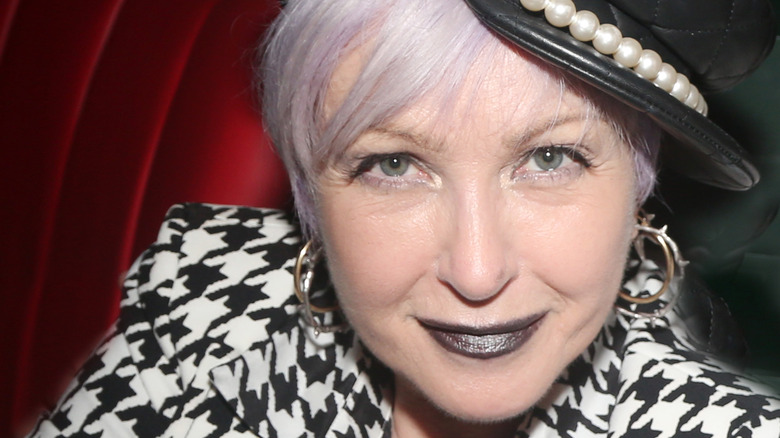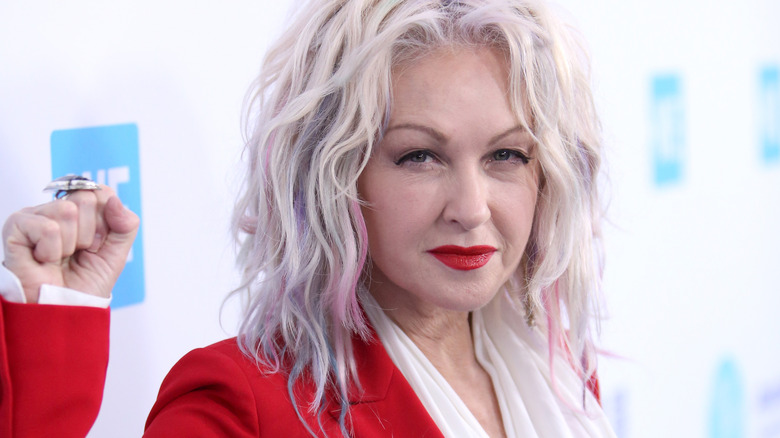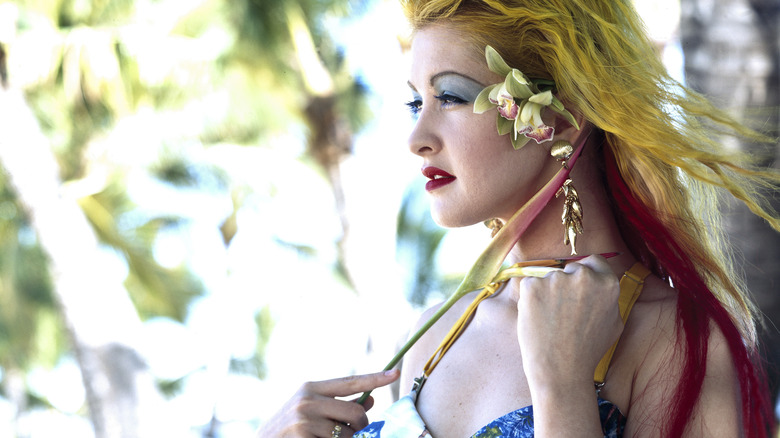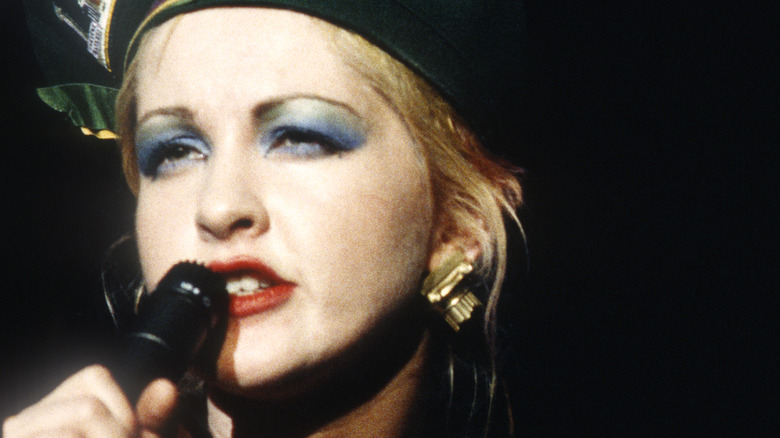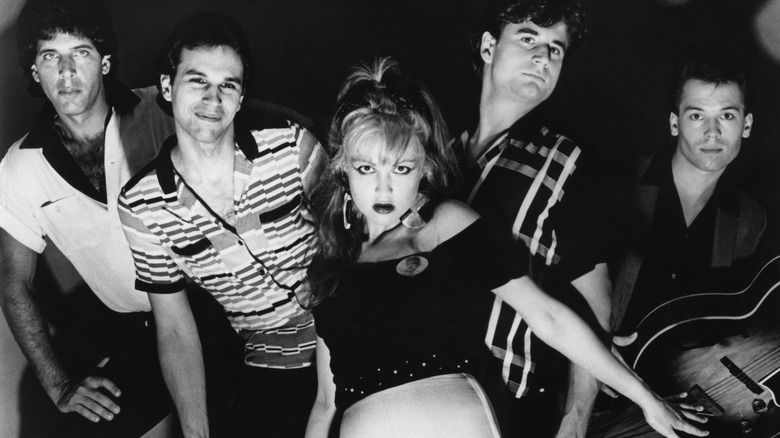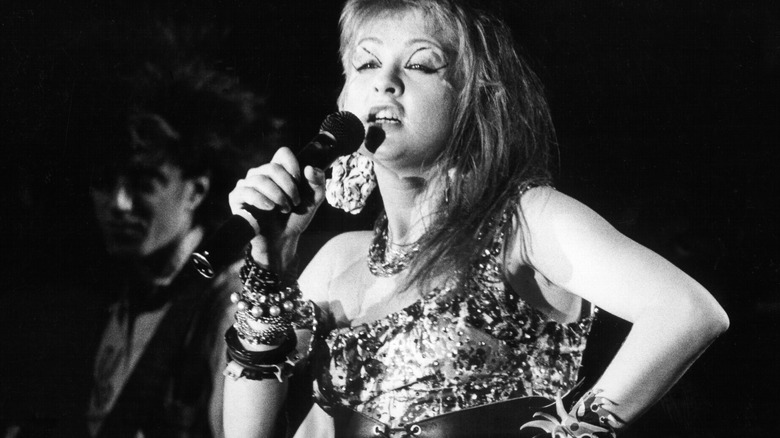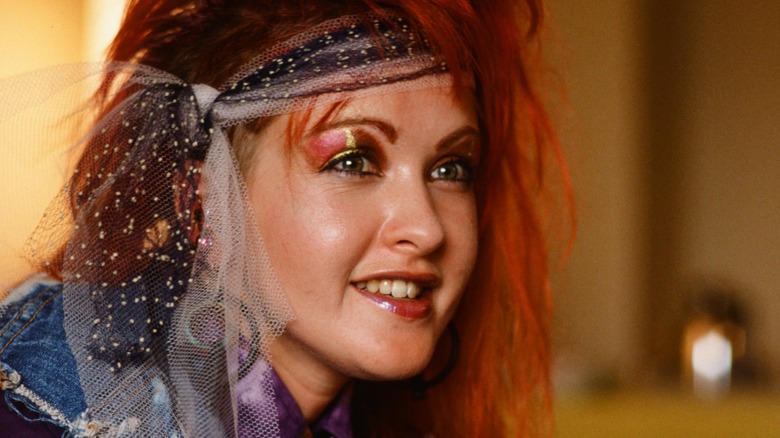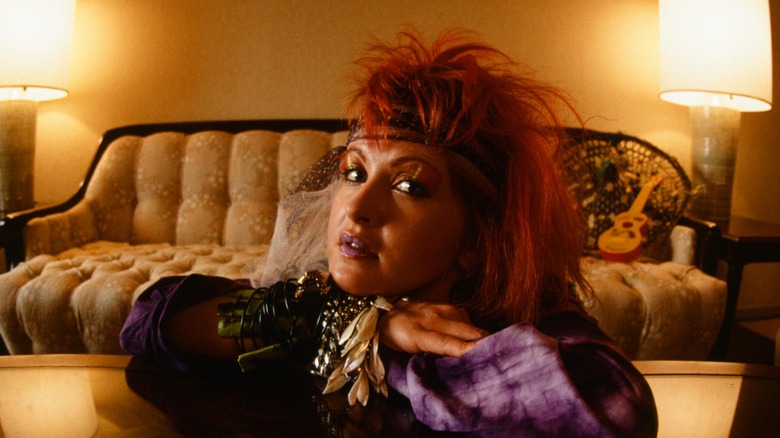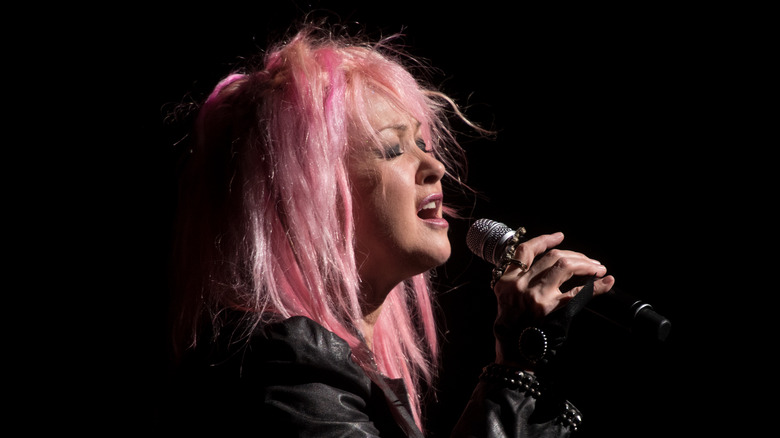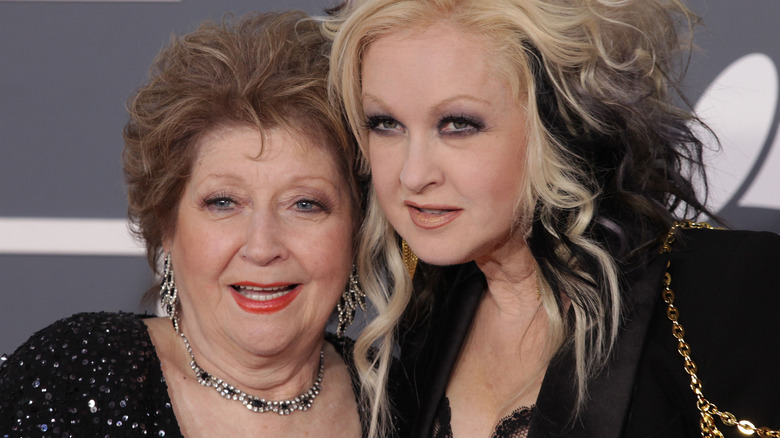Tragic Details About Cyndi Lauper
It's impossible to talk about the soundtrack of the 1980s without talking about Cyndi Lauper. With her funky-colored hair, her bangles, and her iconic wardrobe, she was a logical hitmaker in the era that updated the music industry with MTV and videos. But she was much, much more than that, too, and Lauper has remained relevant — and not just because she's created a musical legacy that includes 14 songs on the Billboard Hot 100 charts, a couple of Grammys, a Tony, an Emmy, and a slew of other awards.
She was also a feminist before being a feminist was cool, and she's continued to not only speak out for women, but to do something infinitely more powerful: Encourage others to speak out. When the American media was rocked by the shocking decision to overturn Roe v. Wade, she was front and center saying that no, it wasn't ok. When she spoke to People in 2022, she said, "I saw these young girls with these 'Girls Just Want to Have Fundamental Rights' signs, and I felt like, 'You know what? It was all worth it.' The little ones, they heard me."
Lauper didn't become famous overnight. Her road to stardom was long and filled with horrific incidents of abuse, sexual assault, loss, and depression — and she fought her way through it all.
She grew up surrounded by heartbreak and missed opportunities
While some children are told that they can be anything they want to be when they grow up, others learn at a very young age that the world can be hard, unfair, and unforgiving. It's the latter outlook that shaped Cyndi Lauper's life growing up.
Lauper grew up in a Queens, New York neighborhood called Ozone Park, and in a piece for The Wall Street Journal, she shared that her home was just a stone's throw from factories run by Singer Sewing Machine and Borden's Milk. She'd sit on her step and watch people trudge to and from work every day: "You'd constantly hear shoulda-coulda-woulda from people who missed their calling, or from disenfranchised women who were put down by their parents or husbands," she wrote.
Inside her home, things were just as bleak. One of three children, she recalled her parents divorcing when she was little, and her mother sharing her own one-time, shoulda-coulda-woulda dreams. She, too, was a singer, and had been given a full scholarship to a musical school — which her parents had forbidden her from accepting. Lauper's grandmother would tell her similar stories of her childhood: She wasn't allowed to date a boy she'd fallen for — he wore glasses — and she'd explained that obedience was just the way it was. Lauper wrote in her book, "A Memoir," "Her stories used to fill me with so many emotions. ... I could never undo the wrong done to her because of a ridiculous mentality that kept women back."
She's been candid about her abusive stepfather
There are moments in a lifetime that can weigh heavy on those who suffer through them, and in her book, "A Memoir," Cyndi Lauper recounted what it had been like, living with her mother and an abusive stepfather. She wrote candidly about a hole in the bathroom door, made when he threw her mother into it. She wrote, too, about why she was always careful to lock the door when she was in there — especially when she was taking a bath.
"I heard a creepy giggle and saw my stepfather's pear-shaped shadow against the frosted glass. I even saw his crazy eye looking through the hole. It was too much. ... It was worse than him standing behind the furnace at night in his robe with that creepy giggle when I had to go into the basement to hang up the wet laundry. It was worse than him touching himself, right outside our bedroom window."
While Lauper recalled fond memories with her sister and the love and devotion of her mother, those memories existed alongside some dark things. She recalled her stepfather threatening to rape her and her sister — and she believed him enough to sleep only lightly, with her door locked. She recalled him hitting her mother, and when the police came in response to a call from the neighbors, she wrote, "... they would say it was just domestic violence and leave." A lapse into apathy helped her get through the days, and as soon as she could, she left.
If you or someone you know is dealing with domestic abuse, you can call the National Domestic Violence Hotline at 1−800−799−7233. You can also find more information, resources, and support at their website.
Her time in Catholic school was filled with abuse and cruelty
Cyndi Lauper was raised in a Catholic family, and explained to the New York Post that her mother's guilt over being divorced had transferred to her at a young age: "I think my mother thought we were gonna go to hell because she was divorced." It led to a lot of conflict: Although she wrote in her book, "A Memoir," that she had grown up thinking that figures like the Virgin Mary and Jesus were "secret friends who you can call in times of trouble," the time she spent attending area Catholic schools was incredibly hard.
In 1984, Rolling Stone interviewed Lauper, who made it clear that there was no love lost between her and the nuns who ran the Catholic schools she'd been first sent to, then kicked out of. She recalled getting slapped across the face for being seen talking to a boy, and when a friend had asked her to scratch an itch on her back, "I was, you know, nine, and she was twelve ... A nun ran in, ripped me off her back, threw me against the lockers, beat the s*** out of me."
The time Lauper spent in Catholic school could be counted in months, but the damage had been done. She consistently failed her classes, even after finding new schools — and even failed art and music. Lauper says that it had shaped her opinion of herself for a long time: "Really, you're a dummy."
She struggled to embrace who she is
Listen to Cyndi Lauper talk about her childhood and teenage years, and it's clear that her strong sense of individuality wasn't always easy for her to deal with — even when she made friends. When she spoke with the New York Post in 2016, she recalled growing up in a very segregated neighborhood. When she was in the fourth grade, her best friend was a Black boy named Edward — while he introduced her to Motown, she could only spend limited time with him: "We couldn't play together, because you didn't want to start trouble."
Rolling Stone interviewed Lauper in 1984, and at the time, they noted that she was still making the transition from "a laughingstock in both her personal and professional lives" to an absolute icon. She was well aware of it, too: "People used to throw rocks at me for my clothes," she explained as she sat down in a restaurant full of people turning to look at her. "Now they wanna know where I buy them, right? Doesn't that seem weird to you?"
It's the people who aren't afraid to be their true selves — to show their "true colors" — who are often bullied the worst, and Lauper grew up feeling it. Casting around to try to find her place as a young adult, she told Rolling Stone, "Sometimes I felt so crumbled. I thought, 'How will I live?' ... You can never run away from yourself. And I tried so hard."
Lawsuit and bankruptcy threatened to derail her career before it started
Before turning to music, Cyndi Lauper worked a slew of odd jobs — including, she told Rolling Stone, waitressing, modeling for art students, and even teaching judo and karate. (Did she know either? No, but that didn't stop her from doing what she needed to do to survive.)
Lauper left home to try to make her own way in the world, but eventually ended up back in Queens. That's when she turned to music, and it wasn't until 1979 that a demo tape for her band, Blue Angel, ended up getting the attention of Allman Brothers' manager Steve Massarsky. They were terrible, she was amazing, and just like she stuck with the band, Massarsky stuck with her. It just didn't fly, though, and after a few rough years, they fired him.
That led to a lawsuit in which Massarsky claimed Lauper and Blue Angel owed him a whopping $80,000. (Adjusted for inflation, that's around $275,000 in today's money.) The lawsuit was so catastrophic for the already struggling band that Lauper filed for bankruptcy. It wasn't until 1983 that her claim was granted, and she was free and clear of the lawsuits and the debt.
She suffered a terrifying sexual assault at band members' hands
Not long after Cyndi Lauper returned to New York and decided to give music a go, she ended up singing in a band that started to get some traction in clubs around the city. She recounted in her book, "A Memoir," that their manager insisted she replaced their regular singer as lead — which, of course, didn't go over well.
Bitterness between Lauper, band members, and their manager escalated into a toxic situation, and when she wrote her memoir, she also wrote that it was the first time she had ever revealed what had happened to her one night, when the band was over at one members' house. He and his girlfriend had a box of sex toys, she said, and continued, "It was all fun and games until all of a sudden it was like the atmosphere in the room changed. He grabbed [the toy], and then two other people grabbed me ... and pulled my pants off."
Lauper said that the assault impacted her on many levels: Not only had she thought the kinship between musicians sacrosanct, but she had been shocked that two women — including her abuser's girlfriend — had restrained her while it happened. Lauper confronted her later, and was told she'd done it just because she'd wanted to make her boyfriend happy. "Everything in my life has been a lesson like that," Lauper later wrote. "Every freakin' thing."
If you or anyone you know has been a victim of sexual assault, help is available. Visit the Rape, Abuse & Incest National Network website or contact RAINN's National Helpline at 1-800-656-HOPE (4673).
A prescription medication caused an abortion
With the 2022 overturning of Roe v. Wade, Rolling Stone says that Cyndi Lauper released a new acoustic version of her song "Sally's Pigeons." It's a heartbreaking look at the reality faced by countless women, including a friend of Lauper's. She wrote the song based on a girl she knew as a teenager, who died after a botched, back-alley abortion.
In her book, "A Memoir," Lauper shared her own abortion story. She had been just starting out in her music career, a struggling artist at a time when the clubs she sang at rarely paid. Feeling incredibly sick and unable to afford medical care, she went to a clinic where a med student examined her, told her she was pregnant, and added that he could give her some medication to make her feel better — as long as she didn't want the baby, because of the likelihood of birth defects.
Lauper took the medicine, and went on to have an abortion. She shared her heartbreak: "Afterward I bled a lot, and cried a lot, because I couldn't believe what happened. ... And I wanted it, even though with the medicine I had taken, the baby might have been deformed. ... I used to cry for a long, long time, onto a pillow that became tear-stained. ... Even when I was famous, I felt the need to hold on to that pillow."
True Colors and Boy Blue came out of grief
In 2021, Rolling Stone spoke with Cyndi Lauper for the anniversary of her second album, "True Colors." Fans, they say, were shocked at the change in tone from her first hit, but know what she was going through at the time, and it makes heartbreaking sense. She described the first time she heard the title song: "I just wanted to get it right — I wanted it to have a soul. ... [I] kept listening to it, because I had just lost my friend from AIDS."
That friend was named Gregory Natal, and she went on to say that before he died, he had asked her to write a song for him. That's a heavy thing to take on, and Lauper says that the song that she wrote with him in mind was "Boy Blue." At the same time, though, she knew that "True Colors" was the song that they all needed: "... it was for me, and his partner who was left behind, and his friends who loved him, to comfort us."
Decades have passed, but grief is timeless. In 2019, Lauper shared a post to her Facebook page remembering her friend, the release of "Boy Blue," and the fact that it coincided with the start of Pride Month. She wrote, "It was so tangled up in so much of my sorrow and so cloaked in my sadness that I don't know if it was good enough for him."
She had to have immediate surgery following an endometriosis diagnosis
Treatment for endometriosis has come a long way, but it's still a painful, potentially debilitating condition. For some context, the Mayo Clinic says that it happens when the lining of the uterus — which is normally shed by the body during menstruation — starts growing in other areas where it can't be eliminated on a monthly basis. That build-up of tissue can cause everything from extreme pain to fertility issues, and Cyndi Lauper was diagnosed with it in 1985.
That, she wrote in her book "A Memoir," was when doctors discovered a group of tumors that had developed in her stomach, including one that had grown to the size of a grapefruit. When she was asked to sign the paperwork giving doctors permission to do what they needed to do during the surgery, she refused. Instead, she insisted that they wake her up and tell her what was going on.
She wrote, "It sounds extreme but I had my own beliefs and convictions, and I was going to live by them — or die by them." Those convictions were rooted in what she had seen happen to her aunt. She had undergone surgery to remove a lump in her breast, but by the time she woke, she had been left with permanent scarring with the removal of much more than she'd expected. Lauper's recovery took weeks, and she suffered several relapses that required more surgical intervention.
She's been candid with her depression and thoughts of suicide
Cyndi Lauper has been incredibly candid about her struggles with depression and suicidal thoughts, writing about it in her book, "A Memoir." After visiting the Soviet Union in 1989 — and after breaking up with her long-term partner, who remained in her life as her manager — she said that the two-week trip had made her realize that even though she was surrounded by people, she was still incredibly lonely. She wrote, "I thought, 'Why don't you just kill yourself? You thought that this would be the pinnacle of your life, and now where are you?'"
At the time, her attempt at breaking into the movies had failed, her record company was dictating what they wanted to hear from her, and her relationship had fallen apart. She was at a point in her career that she had been fighting to reach for so long, and not only was it not great, but she also added, "at the end of the movie, the credits roll — but in your life, that doesn't happen. ... I had to continue living."
Lauper recounted nights where she would do nothing but sit on the floor, cry, drink, and talk to the moon: She wrote, "I thought the sadness would never go away. I must say the only thing that always prevented me from suicide is that I never wanted a headline to read, 'Girl Who Wanted To Have Fun Just Didn't.' ... I didn't want my life to be reduced to that."
If you or anyone you know is having suicidal thoughts, please call the National Suicide Prevention Lifeline by dialing 988 or by calling 1-800-273-TALK (8255).
Her uncle lost his life during Hurricane Sandy
The devastation brought by Hurricane Sandy was well documented, and in November of 2012, The New York Times mapped the final moments of the dozens of New Yorkers who died in the storm. Many were elderly, they said, with most deaths attributed to drowning, downed trees, and the conditions post-storm and pre-cleanup.
Among the dead was 90-year-old George Stathis, who was discovered in the basement of his home in Rockaway Park, Queens. The official cause of his death was drowning, and according to Page Six, it was just days after his death that Cyndi Lauper paid tribute to him by dedicating a performance of "Time After Time" to him.
"I lost my Uncle George in the hurricane," she told the crowd gathered for the Lenox Hill benefit concert. "He was old. He didn't want to leave his house." Lauper had been in Chicago at the time the storm hit, and when she called back home to check on her family, they said what many others had echoed: They didn't think the storm was going to be anywhere near as bad as it was.
Her mother passed away after being diagnosed with several types of dementia
Cyndi Lauper spent the 1980s giving a voice to women and the LGBTQ+ community, and fast forward to 2022, she's doing it again with her reproductive health campaign, "Girls Just Want to Have Fundamental Rights." And according to Today, she credits her mother, Catrine Dominique, with her desire to advocate for change.
When her mother passed away at 91 years old, Lauper posted a heartfelt tribute that not only talked about how grateful she was that they had gotten to work together (she plays Lauper's mother in the "Girls Just Want to Have Fun" video), but also talked about how her mother's experience, struggles, and strength made her very aware of the difficulties that faced — and continue to face — many women. Dominique had been diagnosed with Alzheimer's and dementia: Lauper revealed, "It's a really awful disease, and she never wanted to go that way."
Months later, she was speaking to USA Today about her career, her recent work, and her activism. They gave condolences on the passing of her mother, and Lauper said, "I don't believe she's gone. She's not on the planet anymore, but she's a part of me and I see her all the time. I'm grateful to have had her for so long. She inspired me in so many ways — including doing this fund. ... In the end, ... I was able to stay with her and I feel blessed."
